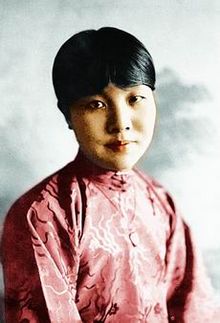Bingxin
Xie Wanying ( Chinese 謝婉瑩 , Pinyin Xiè Wǎnyíng ; * October 5, 1900 in Fuzhou , Chinese Empire ; † February 28, 1999 in Beijing , People's Republic of China ), better known by her stage name Bingxin ( 冰心 , Bīngxīn - "ice heart") or Xie Bingxin , was one of the most prolific Chinese writers of the 20th century. Many of her works were aimed at young readers. She was chair of the China Federation of Literary and Art Circles. Her stage name (literally "ice heart") means something like "morally pure heart" and comes from a poem by Wang Changling from the Tang Dynasty.
Life and literary career
Bingxin was born in Gulou, a district of Fuzhou, Fujian , but moved with her family to Shanghai when she was seven months old. She subsequently moved to the port city of Yantai , Shandong, at the age of four . This move had a great effect on her as the young woman was impressed by the vastness and beauty of the sea. In Yantai, she began reading classics of Chinese literature such as The Tale of the Three Kingdoms and The Robbers of Liang Shan Bog when she was just seven years old. In 1913, Bingxin moved to Beijing . The May Fourth Movement of 1919 inspired and promoted Bingxin's patriotism. She began her writing career when she started writing for a school newspaper at Yanjing University, where she was enrolled as a student. It was here that she published her first novel. Bingxin graduated from Yanjing University with a bachelor's degree in 1923 and moved to the United States to study at Wellesley College , where she graduated with a master's degree in literature in 1926. She then returned to Yanjing University, where she taught until 1936. In 1929 she married Wu Wenzao, an anthropologist and good friend from studying in the United States. Bingxin and her husband visited various intellectual circles around the world and corresponded with other intellectuals such as Virginia Woolf . Bingxin later taught briefly in Japan and, as a traveling Chinese writer, encouraged more cultural exchanges between China and other parts of the world. In literature, Bingxin established the "Bingxin style" as a new literary style. She was a major contributor to children's literature in China (her writings were even used in school textbooks) and performed various translation tasks, including translating the works of the Indian writer Rabindranath Thakur . Bingxin's literary career was very fruitful and productive. She wrote a wide variety of works - prose, poetry, novels, reflections, etc. Her career spanned more than seven decades, from 1919 to the 1990s.
Honors
There is a Bing Xin Literature Museum in Changle, Fujian Province.
Works (selection)
- Jimo (寂寞, loneliness) 1922
- Chaoren (超人, Superman ) 1923
- Fanxing (繁星, A Myriad of Stars ) 1923
- Chunshui (春水, spring water) 1923
- Liu yi jie (六 一 姐, Sixty-One Sisters ) 1924
- Ji xiao duzhe (寄 小 读者, To Young Readers) 1926
- Nangui (南 归, return to the south) 1931
- Bingxin Quanji (冰心 全集, Bingxin's Collected Works ) 1932–1933
- Yinghua zan (樱花 赞, praising the cherry blossom)
- Wo men zheli meiyou dongtian (我们 这里 没有 冬天, There is no winter here ) 1974
- Wo de guxiang (我 的 故乡, My hometown) 1983
- Guanyu nuren (关于 女人, About women) 1999
literature
- Mao Chen: In and Out of Home: Bing Xin Recontextualized . In: Philip F. Williams (Ed.): Asian Literary Voices: From Marginal to Mainstream . tape 12 . Amsterdam University Press, Amsterdam 2010, ISBN 978-90-8964-092-5 , chap. 5 (English, PDF 4.9 MB [accessed on November 16, 2015]).
- Werner Bartels: Xie Bingxin, Life and Work in the People's Republic of China, Studienverlag Brockmeyer, Bochum, 1982, ISBN 3-88339-228-6 , 183 pp.
Individual evidence
- ^ Bing Xin Museum Receives Author's Household Estate. In: www.nanning.china.org.cn. March 24, 2004, archived from the original on March 6, 2012 ; accessed on November 16, 2015 .
Web links
- Literature by and about Bingxin in the WorldCat bibliographic database
- Bing Xin at chinaculture.org (English)
- Bing Xin at Renditions.org (English)
- 冰心 网 (Bingxin Net) (Chinese)
| personal data | |
|---|---|
| SURNAME | Bingxin |
| ALTERNATIVE NAMES | Xin Bing; Wan-ying Hsieh; Bingxin Xie; Ping-hsin hsieh; Bing sin; Ping-hsin; Hsin ping; Wanying Xie |
| BRIEF DESCRIPTION | chinese writer |
| DATE OF BIRTH | 5th October 1900 |
| PLACE OF BIRTH | Fuzhou |
| DATE OF DEATH | February 28, 1999 |
| Place of death | Beijing |
